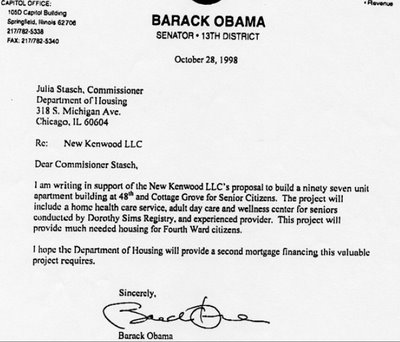The Boston Globe on June 27, 2008 published an article by Binyamin Appelbaum about Obama’s state senate record on public housing. As a follow-up, Mr. Appelbaum was interviewed on July 1, 2008 by National Public Radio’s Farai Chideya along with Illinois state representative Julie Hamos. Ms. Hamos spoke in defense of private developers getting tax dollars to rehab public houing and Mr. Appelbaum elaborated on his report.
You can listen to the entire interview at the link above or here. I am going to highlight a few excerpts.
Farai: So, Binyamin let me start with you. Your article focuses on Grove Parc Plaza – it’s a development located in the district that Obama represented for eight years when he was a state senator. So, uh, tell us why you zeroed in on this development.
Binyamin: We were interested in Obama’s years as a state senator because it’s sort of his largest body of work as a politician. And so we thought it would be instructive to look at how he did, and the issue of affordable housing was a signature issue for him; it was one of his major focuses both before becoming an elected official and during his time as an elected official. And what we found was that the policies that he supported in many cases, produced developments that failed. And furthermore, many of the major beneficiaries of those policies have been his friends and supporters. And many of the people who have suffered were his constituents, people who lived in his state senate district. Grove Parc is one of the outstanding examples of this problem. It sits on the border of Obama’s district, its 504 apartments of subsidized housing of fully renovated in the early 1990’s, uh, that have fallen in to such disrepair that the plan now is to demolish them and start all over again. It was built by a non-profit, led by a number of Obama supporters. It was managed during the period of its greatest decline by a company called The Habitat Company, which is led by Valerie Jarrett, who is a senior advisor to Obama’s presidential campaign. And it’s, it’s as I said, in his district. So it struck us as sort of emblematic of the issue we wanted to write about.
Mr. Appelbaum provides a very reasonable to explore Obama’s career as a state senator – “his largest body of work as a politician.” Focusing on Tony Rezko’s illegal activities obscures that Mr. Obama was largely ineffective in making changes or fighting the status quo. As Appelbaum noted, he maintains advisors who were with him in Chicago. For instance, former Habitat head, Valerie Jarrett is touted as a top administration pick.
Appelbaum says the Obama campaign did not address his questions completely.
Farai: You did reach out to Senator Obama, what did he tell you about his perception of the issues that you raised?
Binyamin: The Obama Campaign affirmed Senator Obama’s support, uh, for the policy of subsidizing private developers and managers of affordable housing. It did not respond to questions about whether the Senator was aware of problems in his district.
Rep. Hamos still stuck up for private-public partnerships.
Farai: Now Julie, let me go to you. From your perspective, as someone who is a state representative, what did you think of the article? Um, what do you think of the entire issue of, um, privatizing public housing, whether or not it’s worked, and whether or not there is a hint of perhaps too much leeway being given to developers linked to the Senator?
Julie: Well, first of all, I thought the article was unclear in the way that it focused on some projects, and in this particular case, Grove Parc is a great example. Grove Parc was built in 1970 under, really under a failed policy of the federal government. It was called Project Base-Section 8– it was built as a project-base-section-eight program. And these projects, typically, did not have enough money put into them by the federal government, for the kind of maintenance we really need long term to make sure they succeed. This is exactly the kind or programs that we’re not really building anymore. And Grove Park is an example of that. Those have been replaced now by more innovative and successful policies, and those policies are in fact the privatize-public partnerships that we should be really applauding. They are the partnerships used in tax credits that have now created thousands of units of much smaller developments out of mixed-income developments, and really been revitalizing neighborhoods. So, I fully support, as a public policy maker, what we are trying to do now, which is to bring in private developers using market based incentives to get them to build affordable housing. This is still a very big issue in most communities. It certainly is here in Illinois. But it is the model that is working. Grove Parc is an old model that didn’t work, and we replaced it.
Reporter Appelbaum came to the conclusion that Obama did not help his people when he could have done so.
Farai: Binyamin, let me bring this back into a larger framework, which is Democratic politics. Um, the issue made headlines during the democratic primary. Let’s listen to Senator Clinton in South Carolina:
Senator Clinton: I was fighting against those ideas when you were practicing law and representing your contributor Rezko in his slum land-lord business in inner-city Chicago.
Farai: That’s Senator Clinton attacking Senator Barak Obama for his connection to Antonin Rezko and Rezko was a major Obama fundraiser. Give us a little more of a context, Binyamin, on what exactly the connection is between Rezko and Obama.
Binyamin: Rezko is a really interesting example. Rezko, who was one of Obama’s primary fundraisers, particularly for his earlier political campaigns, he was a friend of the Senator’s, he was involved in Obama’s purchase of a home in 2005, but what is really interesting about Tony Rezko is that he was a developer on the model that, uh, (Ms. Ramos) was just describing. In that he built mixed used, mixed income housing, mixed income communities, scattered across Chicago, small numbers of developments. The model that was both/built to replace Grove Parc. And that also failed spectacularly. And it failed for the same reason, which is the private managers, private developers, were not equity supervised by the government. They all say that they didn’t get enough money to manage these projects. Perhaps that’s true, although some of them succeed, and some of them fail – those that succeed said they do have enough money and those that fail said that they don’t have enough money. But whether or not that’s the issue, the fact of the matter is this new, new model, this third generation of subsidized development so far it doesn’t have a better track record than the generation that included Grove Park. Which incidentally, was most recently redone after the administration of Harold Washington. One broader note here, which is as much as this is a story about what happened in Chicago, it’s also a story about what did not happen. And specifically, it’s not, we’re not in any way finding that Barak Obama directed money to these developers, that he was directly responsible for the suffering of his constituents. What’s interesting here is that Obama did not stand up and point his finger at the problems, and he did not participate, as best we can tell, in an effort to correct the problems. That, that to me is as much the issue as what went wrong.
The interviewer asks Ms. Hamos about Obama’s performance and in my view, she does not answer the question. She says in part:
We understand that these affordable housing developers don’t have a lot of cash going though them. They’re for very low-income people. And it’s a challenge to manage these well, and it’s a challenge to get enough money to have good on-site management operations. So we understand this – that some developments do better than other developments. And yet we don’t stand up an accuse and blame the people that we’re trying to bring into the process. It is one of the challenges for building housing for very low income people that continues to today.
I think she is saying Obama should not have confronted mismanagement because he needed the developers (“the people that we’re trying to bring into the process”). I am not sure really, but it sounds like enabling poor outcomes.
Other posts in this series:
Part One: Obama’s housing policies: Is past prologue?
Part Two: Obama’s housing policies: Cold constituents
Part Four: Obama’s housing policies: Obama’s housing advisors

